

Start Here. The Freedom to Learn.
This well-written piece from Knowledge Quest uses the AASL standards to demonstrate how intellectual freedom is demonstrated through different domains in the AASL standards for school librarians. – alyrayj
Why is Intellectual Freedom Important? By: Valerie Nye I have been asked in the last year “is freedom of speech important to you because you are a librarian, or would you support it even if you weren’t working in libraries?”
This is a personal story that shines some light on the importance of Intellectual Freedom. A must read for any teacher/media specialist ready to teach information literacy. – alyrayj
My immediate response was that it doesn’t matter what I am doing; I believe in intellectual freedom and the right to free speech no matter what I am doing with my career.
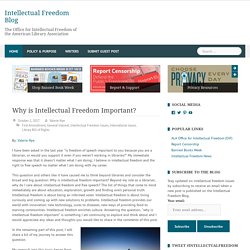
This question and others like it have caused me to think beyond libraries and consider the broad and big question: Why is intellectual freedom important? Beyond my role as a librarian, why do I care about intellectual freedom and free speech? The list of things that come to mind immediately are about education, exploration, growth and finding one’s personal truth. Champions of Intellectual Freedom. Library Bill of Rights and Freedom to Read. Information Literacy in a World of Misinformation.
By now, all of us have heard the term fake news.
This article lays out some great motivations for incorporating information literacy into existing lessons and curricula. – alyrayj
It’s become another overused phrase, insidious in how it sticks like a bad smell.
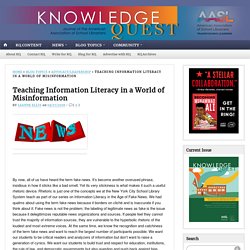
Yet its very stickiness is what makes it such a useful rhetoric device. Rhetoric is just one of the concepts we at the New York City School Library System teach as part of our series on Information Literacy in the Age of Fake News. We had qualms about using the term fake news because it borders on cliché and is inaccurate if you think about it: Fake news is not the problem; the labeling of legitimate news as fake is the issue because it delegitimizes reputable news organizations and sources. If people feel they cannot trust the majority of information sources, they are vulnerable to the hyperbolic rhetoric of the loudest and most extreme voices. I believe the answer is finding out what information literacy instruction is already going on in classrooms. Author: Leanne Ellis Like this: Like Loading... For Minors: Access to Library.
The American Library Association supports equal and equitable access to all library resources and services by users of all ages.
A little bit of a deeper dive into one of the rights in the Library Bill of Rights, this applies directly to the demographic we teach in K-12 schools and clarifies why librarians may encourage research in more ways than others. – alyrayj
Library policies and procedures that effectively deny minors equal and equitable access to all library resources and services available to other users is in violation of the American Library Association’s Library Bill of Rights.
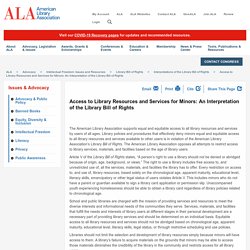
The American Library Association opposes all attempts to restrict access to library services, materials, and facilities based on the age of library users. Article V of the Library Bill of Rights states, “A person’s right to use a library should not be denied or abridged because of origin, age, background, or views.” Tools, Publications & Resources. The ALA Office for Intellectual Freedom provides confidential support during censorship challenges to library materials, services, and programs.
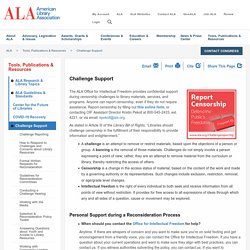
Anyone can report censorship, even if they do not require assistance. Report censorship by filling out this online form, or contacting OIF Assistant Director Kristin Pekoll at 800-545-2433, ext. 4221, or via email: kpekoll@ala.org. As stated in Article III of the Library Bill of Rights, “Libraries should challenge censorship in the fulfillment of their responsibility to provide information and enlightenment.” A challenge is an attempt to remove or restrict materials, based upon the objections of a person or group.
A banning is the removal of those materials. Banned Books Map. The School Censored Their Newspaper, So These Teens Launched Their Own. Top 100 Most Banned and Challenged Books of the Decade.
At the end of a decade, we can look back at the most challenged books. This could be an interesting tool to pair with the map and look at common themes or topics that are challenged. – alyrayj
LGBTQ Infographic.
ISTE Standard Knowledge Constructor 3.
The ISTE standards are internationally accepted standards for both educators and students, and this particular standard focuses on research processes. – alyrayj
ISTE DIgital Citizenship Poster.
This infographic from ISTE summarizes key skills and purposes of a digital citizen in an eye catching design. – alyrayj
Unmasking the Digital Truth / FrontPage. Please check out and subscribe to the "Balanced Filtering in Schools" blog.
While this resource is outdated, the topic is still hot in public schools and relates directly to intellectual freedom. This could be a great source to lead into an argument or debate about internet filters. – alyrayj
Direct questions about this website to Wesley Fryer.
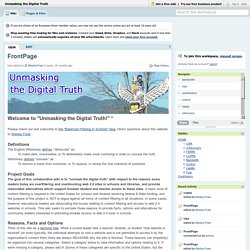
Definitions The English Wiktionary defines "obfuscate" as: To make dark; overshadow, or To deliberately make more confusing in order to conceal the truth. Wiktionary defines "unmask" as: To remove a mask from someone, or To expose, or reveal the true character of someone.